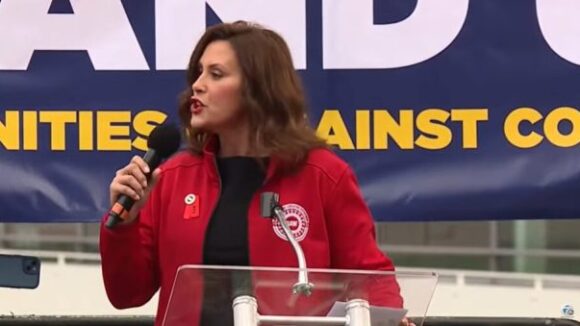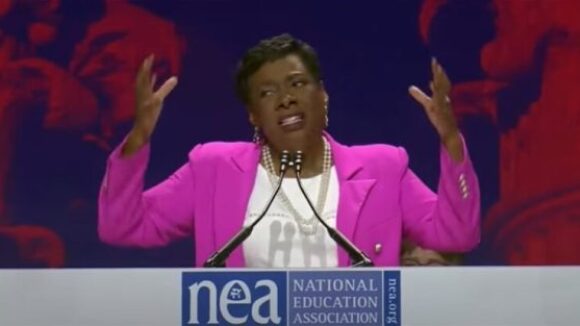Tyranny Triumphs in the Great Lakes State
Ignoring ample evidence of forced unionism’s unfairness and its damaging impact on jobs and incomes, Big Labor Michigan Gov. Gretchen Whitmer signed Right to Work destruction in 2023.
Secretary-Treasurer of the UAW Has ‘Let the Cat Out of the Bag
(From the August 2014 National Right to Work Committee Newsletter)
The fundamental aim of Right to Work laws is to protect the freedom of the individual employee, and not either to hurt or to help union officials.
But whatever they say publicly about Right to Work, union bosses know that, in exchange for losing the privilege of forcing reluctant employees to fork over union dues or fees, they start out on a better foot with employees in general.
 It Reassures Workers to Know They Won’t Have toBankroll a Harmful Union
It Reassures Workers to Know They Won’t Have toBankroll a Harmful Union
“When a union organizer visits an employee of a union-free business, there are a number of concerns about unionization the employee may potentially have,” observed Greg Mourad, vice president of the National Right to Work Committee.
“Some of the concerns could be equally, or nearly equally, applicable to a business in a Right to Work or a forced-unionism state.
“For example, regardless of where a unionized business is located, Big Labor may wield its monopoly-bargaining power to impose counterproductive work rules and other contract provisions that unfairly penalize talented and conscientious employees and, ultimately, destroy jobs.
“But it is nevertheless reassuring to many employees to know that, if it turns out they personally don’t benefit from unionization, they will retain the option to refuse to join or pay dues or fees to the union.”
‘This Is Something I’ve Never Understood, That People Think Right to Work Hurts Unions’
“For Big Labor, the reassurance Right to Work laws give employees facing an organizing drive that they won’t be forced to bankroll a union they don’t want is a clear advantage,” Mr. Mourad continued.
“Of course, the Big Labor ‘downside’ is not being able to extort money from employees who prefer not to join after a successful union organizing campaign.
“Interestingly enough, back in February, veteran United Auto Workers union organizer Gary Casteel, who has since been promoted to UAW secretary-treasurer, admitted that, as far as he is concerned, the upside of Right to Work laws for Organized Labor is greater than the so-called ‘downside.’
“Although Mr. Casteel’s remarks on how Right to Work laws affect unions were apparently made roughly six months ago, they were first published in a July 1 Washington Post article by overtly pro-Big Labor reporter Lydia DePillis.”
There’s “a school of thought,” wrote Ms. DePillis, “that says it’s not such a great thing to have everyone pay dues whether they want to or not.” She then cited Mr. Casteel’s explanation for why he “prefers right-to-work environments” for organizing:
“This is something I’ve never understood, that people think right to work hurts unions. . . .
“To me, it helps them. You don’t have to belong if you don’t want to.
“So if I go to an organizing drive, I can tell these workers, ‘If you don’t like this arrangement, you don’t have to belong.’
“Versus, ‘If we get 50% of you, then all of you have to belong, whether you like it or not.’ I don’t even like the way that sounds. Because [Right to Work] is a voluntary system, if you don’t think the system’s earning its keep, then you don’t have to pay.”
Committee Officer Urges Other Union Bosses to Join Mr. Casteel in Facing the Truth
Mr. Mourad commented: “Of course, the fact that Gary Casteel has acknowledged one important fact about Right to Work laws that other union bosses seek to obscure doesn’t make him a saint.
“In fact, I’m confident Right to Work advocates will continue to have to battle Mr. Casteel on a number of fronts. [See the story beginning on p.8 of this Newsletter edition for one example.]
“Nevertheless, I commend Mr. Casteel for ‘letting the cat out of the bag’ with regard to the impact of Right to Work laws on unions, and I urge other union officials to join him in facing the truth about this matter.”

Ignoring ample evidence of forced unionism’s unfairness and its damaging impact on jobs and incomes, Big Labor Michigan Gov. Gretchen Whitmer signed Right to Work destruction in 2023.

Largely thanks to the Right to Work attorney-won U.S. Supreme Court decision in Janus v. AFSCME, union bosses like NEA President Becky Pringle are no longer able to block virtually all meaningful education policy reforms.

Avelo employee Kim Howard believes all the firm’s flight attendants should get to vote on continued AFA rule. Credit: WTNH-TV (ABC,…